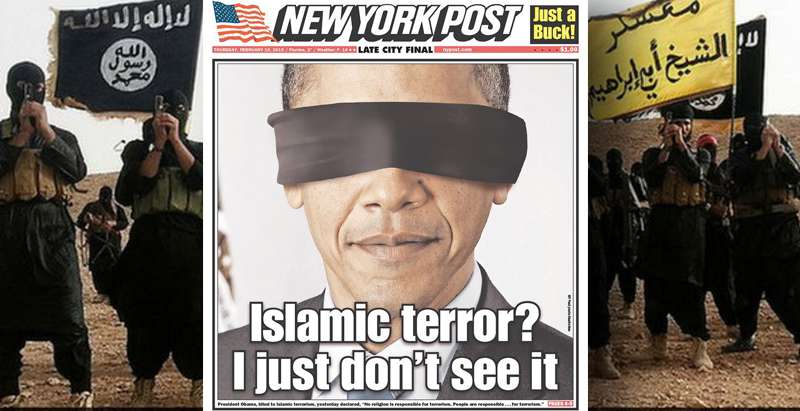This is the season of contrast in responses to Islamic terrorism. On the one hand, in the aftermath of the Copenhagen, Denmark shootings and the Paris slaughter of 17, Muslims in Norway pledged to create a circle of Muslims to protect Jews worshipping in a synagogue, challenging that “If anyone wants to commit violence in the name of Islam, you will have to go through us Muslims first.”
On the other hand, the leader of the free world, President Obama, refused to acknowledge that the Paris assailant deliberately targeted his victims because of their Jewish faith. Instead, Obama stated that Americans are right to be concerned when “violent, vicious zealots” just “randomly shoot a bunch of folks in a deli in Paris.”
Obama and his administration refuse to call the problem we face “Islamic terrorism.” When the administration sponsored a summit on “countering violent extremism,” the summit’s main proposals included addressing the terrorists’ grievances; calling for law enforcement to stop surveilling U.S. mosques; and chastising older, peaceful Muslims for being “boring” in their messaging compared to the slick beheading video recruitment tools of the Islamic State in Iraq and Syria (ISIS).
In discussing the gruesome deaths of 21 Coptic Egyptians who died professing Jesus Christ, Obama referred to them merely as Egyptian citizens, as though they were just more random victims of a purposeless extremist group of unknown affiliation. If only there were a jobs program to keep these underprivileged elements from becoming radicalized.
This delusion is par for the course for this administration, reminiscent of when Obama’s former secretary of State and presumptive 2016 Democratic presidential nominee, Hillary Clinton, testified before the Senate in 2013 about the attack on our Libyan diplomatic annex: “Was it because of a protest or was it because of guys out for a walk one night and decided they’d go kill some Americans?”
Another contrast involves the willfully blind assessment of the latest Islamic terrorist group, ISIS. Obama portrayed ISIS as a “jayvee team,” but ISIS controls a territory as large as the United Kingdom, gains fresh recruits each day and continues to mock the West with brutal made-for-YouTube murders of Americans, nonconforming Muslims and other vulnerable ones, including children. Still, he continues to downplay the threat from ISIS and Islamic terrorism generally. In stark contrast to Obama’s approach, Egyptian President Abdel Fattah al-Sisi and Jordanian King Abdullah acknowledge the grave threat that ISIS presents. Obama responded to the beheading of American journalist James Foley with a long golf game.
Worse yet is the contrast involving whether and how we prioritize combating Islamic terrorism. In his State of the Union address, Obama spent most of his speech offering new giveaways and proposing tax increases on the middle class. Obama referenced Islamic terrorism not once, trying to convince America that on terrorism, we have turned the page. In contrast to this lack of prioritization by our commander in chief, Egyptian and Jordanian leaders launched aggressive airstrikes immediately after ISIS murdered their citizens. The Kingdom of Jordan sent an even stronger message when it executed two convicted and condemned terrorists the day after the release of the immolation video of their pilot’s excruciating final moments.
All of these contrasts reveal flaws that lead to a deeply problematic policy underlying the Obama administration’s ongoing negotiations with Iran over its nuclear program. Iran, a state sponsor of terrorism for nearly four decades, continues to destabilize its neighbors and it aims to destabilize the globe. Houthi rebels, back by Tehran, toppled Yemen’s American-supported government with such haste that they even gained possession of U.S. embassy vehicles when U.S. embassy personnel retreated from the country.
Iran has made no secret of its quest to be a nuclear power, which would ultimately result in increased global nuclear proliferation and the destruction of the fragile balance of power in an already chaotic Middle East region.
Saudi Arabia, currently not a nuclear power, would feel pressure to match Iran’s firepower if Iran acquired nuclear weapon capabilities.
America’s close ally, Israel, may be the country most at risk from Iran’s development of nuclear weaponry. Iranian leaders continue to call for the destruction of the nation of Israel. The Obama administration continues to shut out Israel from the negotiations, despite its vital interest in them.
The Obama administration mishandled the terrorist threat posed by Islamic jihadism from day one by failing to call it by name and make it a top priority. While some Americans may be scared by the administration’s severe delusion, the more ominous threat is that the situation will grow worse, in turn limiting our options and leaving us unprepared.
Obama could take a lesson from the Norwegian Muslims and join hands with other world leaders and loudly state from his global pulpit that “If anyone wants to commit violence in the name of Islam, you will have to go through us Americans first.”
President Obama has the power. But, from all appearances, he lacks the will.
First published in The Hill in March 2015








